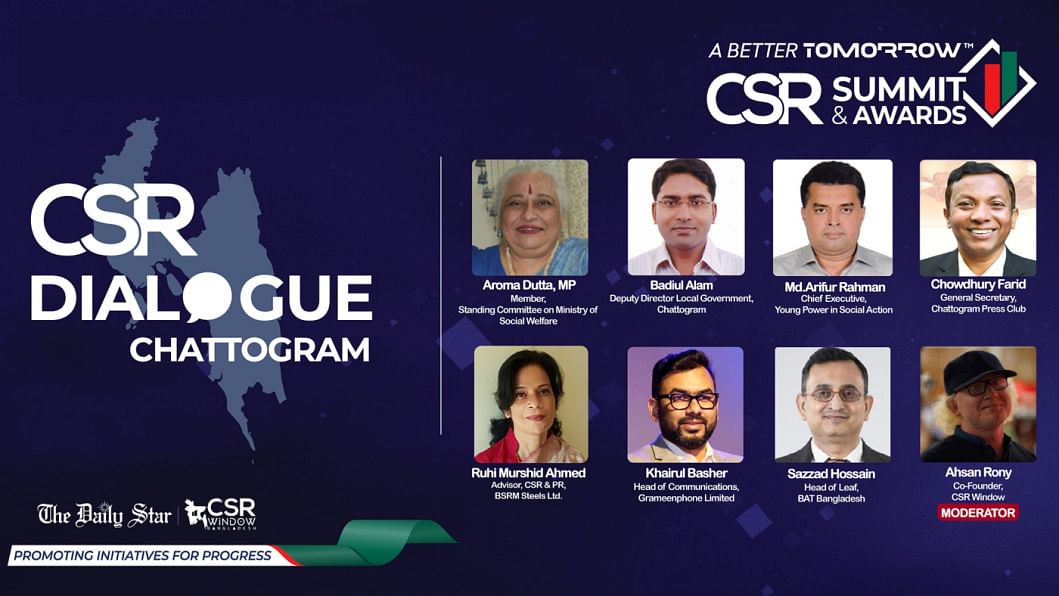Engage more young people in CSR

Speakers at an online discussion recommended that Corporate Social Responsibility (CSR) initiatives should engage local youth organisations by providing them with the opportunity to access CSR funds. This will ensure that the youth gain skills in project development and implementation and can thereby continue to push for social change.
The event titled "CSR Dialogue: Chattogram" was held on August 5, 2021. It was part of a joint initiative of The Daily Star and CSR Window known as "A Better Tomorrow: CSR Summit and Awards". The annual nationwide programme aims to create dialogues for future development and sustainability solutions and recognise corporations for their innovative and world-class CSR initiatives, social projects and programmes implemented for sustainable impacts in society.
Antu Kumar Roy, a member of Dhrubotora Youth Development Fund (DYDF), said, "Currently, all of our foundation's activities are funded by our members. It puts a burden on us, which is why CSR funds should be made available for us. If the corporate sector is not happy with our project proposals or lack of experience, we request that they provide us with an avenue to make up for this deficiency. I would also like to request more experienced NGOs to partner with us to help us become a more skilled and professional organisation."
Arifur Rahman, Chief Executive, Young Power in Social Action (YPSA), said, "Smaller, local organisations struggle to avail CSR funds as their project proposals are usually not up to the mark due to a lack of experience. There are many youth organisations in Chattogram that are also suffering because of this issue. I hope that the corporate sector will allow them to avail these funds and thereby provide them with an important learning opportunity. YPSA looks forward to helping youth organisations such as DYDF gain more experience and knowledge regarding CSR."
Khairul Basher, Head of Communication, Grameenphone (GP), said, "GP has been primarily working with SDG 10 for its CSR programmes, which focuses on reducing inequality. Apart from our regular social responses such as Child Online Safety drives and timely disaster response we have established platforms such as our accelerator programme for anyone who wants to set up their own start-up or organisation. The GP Explorer initiative provides a platform for the youth to develop important skills required for professional improvement. I would highly recommend smaller youth organisations to take a look at the facilities from these two initiatives to improve their capacity so that they can work with CSR in the future."
Farid Chowdhury, Secretary General of Chattogram Press Club, said, "When big companies like GP and BSRM want to start any CSR initiative, they should use newspapers, especially local newspapers, to engage potential implementing organisations. We will also allocate space in our newspapers to showcase the work of local youth organisations, as this can help them gain attention from big companies that might consider giving them access to some CSR funds."
Ruhi Murshid, Advisor, BSRM Ltd., suggested that companies establish different categories for their CSR projects.
"The current issue is that the corporate sector has to pay tax on the CSR funds that they spend. Such taxes severely discourage them from continuing to work with CSR. I would request the government to exempt CSR funds from taxation," she said.
Dr Badiul Alam, Deputy Director Local Government (DDLG), Chattogram Deputy Commissioner (DC) Office, said, "Many small businesses donate funds instead of working in the CSR framework. If we could establish a joint CSR fund where all these businesses could donate, the impact would be more meaningful. We also encourage small NGOs and youth organisations that are working locally to approach the DC office for any kind of support."
Aroma Dutta, MP, Member, Parliamentary Standing Committee on Social Welfare, said, "As Bangladesh approaches graduation, it will no longer be in the least developed country (LDC) category. As a result, foreign donors will slowly reduce investment in our development sector. To ensure that we are prepared for this scenario, we need to become self-sufficient. The government should incentivise the corporate sector's CSR activities so that it can become a sustainable form of social investment. They can do so by allowing the corporate sector to use a market systems development approach in their CSR projects. With the participation of the government, corporate sector and civil society, we can establish a self-sufficient development sector that will continue to thrive and strengthen our country. The corporate sector should also encourage the participation of youth organisations in their projects, as with a little bit of working experience, these youth organisations can become an asset for the corporate sector."
Sazzad Hossain, Head of Leaf, BAT Bangladesh, also joined the discussion. He highlighted some of BAT Bangladesh's notable CSR initiatives like Bonayan, Probaho and Deepto and urged all companies engaged in CSR initiatives to work together with local government institutions, NGOs and youth organisations to better understand the scenario at the grassroots level. The session was moderated by Ahsan Rony, Founder, Green Savers.

 For all latest news, follow The Daily Star's Google News channel.
For all latest news, follow The Daily Star's Google News channel. 



Comments